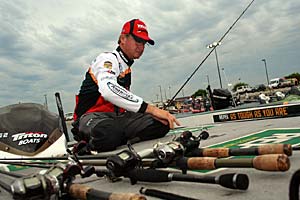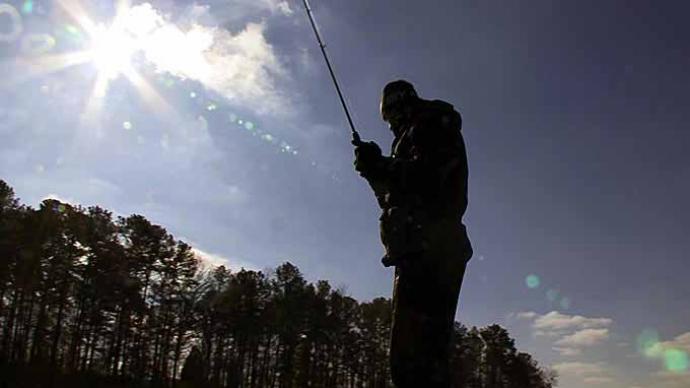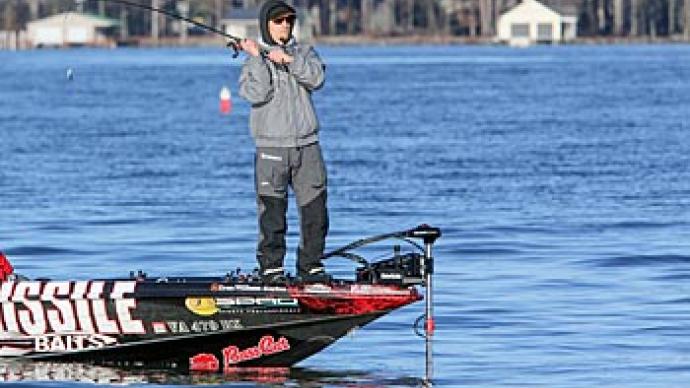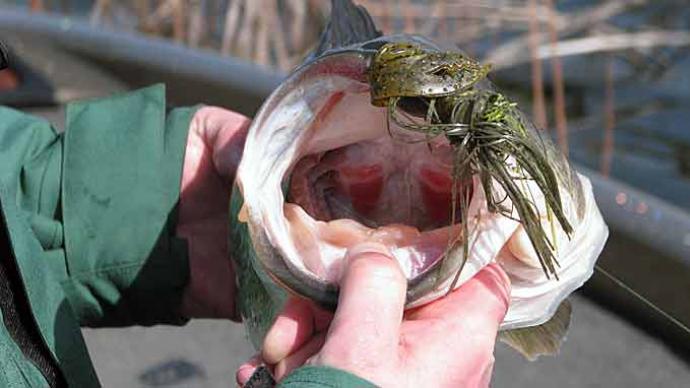
Cold and slow bass fishing. That's what you will face in your tournament fishing at this time of year. On the local and state level, most of you won't start competing until next month. More likely than not, the only the lakes where tournaments will be held in January here in Texas, or anywhere else, will be in the Deep South or on a power plant lake. If you fish a hot-water lake you wont have to pay as much attention to the weather as you would on a regular lake.
During January in the Deep South, a lot of bass will be real close to, or even in full-blown spawning mode. On most hot-water lakes one end will be warmer than the other. There could very well be two totally different patterns so the best method, or pattern, is what you need to look for. The best pattern will work with your strong points. For example, if you're forte is fishing spinnerbaits in shallow water, then you should look for water conducive to that type of fishing. If it's crankbaits, topwater, or worm fishing you must seek out water that you can fish in these ways.
Another factor that you must realize is that on hot-water lakes you will likely face quite a crowd. Everybody else will be fishing the warmer lakes right now and because power plant lakes are limited, the problem of crowding is magnified.
In this situation I'll look for fish in deeper water. Most anglers will be fishing shallow and therefore there will be a lot of pressure on these, usually very active fish.
No matter how hot the water, I've always been able to find active fish in deep water. Remember fish in deep water on lakes like Squaw Creek is relative. It may be 30 to 50 feet, but on Fairfield it might be 10 to 20 feet deep.
When it comes to cold-water lakes, most of the fish will be in deeper water. You have to realize that January in Texas the fishing in cold-water lakes is going to be slow and tough even when we've had some mild weather. Keep in mind that bass will be cold and sluggish, so you must avoid stained or muddy water conditions. For sluggish fish the strike zone is very small. To increase your odds of catching fish you must seek out the clearest water that you can find. Look for deeper creek channels, drop-offs and points. The use of a graph is critical during winter. A good flasher will work, but a quality graph (Pinpoint is the best) will take out the guesswork of what is below you.
The first and foremost thing that I look for is schooled up shad. The bass won't be far from their food source. The shad will relate to creek channels, drop-offs and points so it goes without saying that this is why bass will be in those areas.
Before a tournament I always keep track of the weather trend for at least three or four days. Even a rise of two or three degrees of water temperature can show up on the activity level of the fish. And by the same token, a drop in water temperature can really make for a tough bite.
Typical cold-water lures of course will be a jig-and-pig, jigging spoons, slow-rolled spinnerbaits or even a deep-diving crankbait. A couple of small things that can increase your chances are to use a 3/4- ounce spinnerbait and exchange the blades for a couple of sizes smaller ones. On crankbaits I'll use one that has a wide wobble, and with line heavier than 12-pound test.
Another thing you can do this month to help your tournament fishing is to work on preparations for the coming season. If you wait until March to put your boat in the service department you might have to wait two to six weeks to get it back. Now is the time to do routine maintenance. You can prevent problems from popping up during a tournament.
Use this time to do your homework. Start researching the lakes where your events are being held. Study maps of the lakes and read articles, even older ones on these lakes. I also like to study tournament results from the last few years on the lakes where I have events. Then I know what to expect in size of fish that I need to locate to do well.
I like to use this time to organize my maps, secure line and other items I'll need, repair reels, change hooks on baits and sharpen dull ones. These are all things that it is better to do now than when the season begins. So while the fishing is slow, get ready for when it is not.
Good luck and God Bless.
Bill Wilcox is sponsored by Ranger Boats, Yamaha Outboards, MCMC, BG Products, Pro Rule, Johnson Fiberglass, Brown's Automotive, Continental Batteries, Kistler Rods, Swamp Hog Lures, Strike King Lures, and Fun-n-Sun Sports Center.




